| |||||||||||
| |||||||||||
| |||||||||||
 |
|---|
| Constitution |
Presidential elections were held in South Ossetia on 10 November 1996. [1] The result was a victory for the incumbent head of state Lyudvig Chibirov, who received 52% of the vote. [2]
| |||||||||||
| |||||||||||
| |||||||||||
 |
|---|
| Constitution |
Presidential elections were held in South Ossetia on 10 November 1996. [1] The result was a victory for the incumbent head of state Lyudvig Chibirov, who received 52% of the vote. [2]
This was the first election in the region since the 1990 Georgian Supreme Soviet election before the collapse of the USSR and Georgian independence. Since prior to the region's breakaway in 1991, the head of state's title had been 'Chairman of the Presidium of the South Ossetian Supreme Council', a role equivalent to Speaker, and there had been three officeholders since the declaration of independence: Torez Kulumbegov from 1990 to his imprisonment in 1991, then Znaur Gassiev who held the role during Torez's imprisonment in 1991–1992, before Torez returned to the position in 1992; he was succeeded in 1993 by Lyudvig Chibirov, who held office until 1996 when the Parliament of South Ossetia issued a series of amendments to the constitution which created a new presidential form of government. [3]
Chibirov was elected with 52% of the vote, meaning no runoff was required. Gerasim Khugayev finished second with 24% while three other candidates collectively received 24% of the vote.
| Candidate | Votes | % |
|---|---|---|
| Lyudvig Chibirov | 52.3 | |
| Gerasim Khugayev | 23.9 | |
| Three other candidates | 23.8 | |
| Total | ||
| Registered voters/turnout | 61.3 | |
| Source: Jeffries | ||
Georgian President Eduard Shevardnadze stated that the elections "cannot be considered legitimate", but said that the peace process "should go ahead". [1]

South Ossetia, officially the Republic of South Ossetia – the State of Alania, is a partially recognised landlocked state in the South Caucasus. It has an officially stated population of just over 56,500 people (2022), who live in an area of 3,900 square kilometres (1,500 sq mi), on the south side of the Greater Caucasus mountain range, with 33,000 living in the capital city, Tskhinvali. Only Russia, Venezuela, Nicaragua, Nauru, and Syria recognise South Ossetia as a sovereign state. Although Georgia does not control South Ossetia, the Georgian government and the United Nations consider the territory part of Georgia.

Eduard Dzhabeyevich Kokoyty is an Ossetian politician who served as President of the partially recognized state of South Ossetia. His term in office lasted just under ten years, beginning December 2001 and ending December 2011.
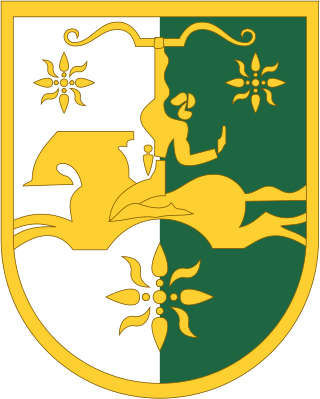
Politics in Abkhazia is dominated by its conflict with Georgia. Abkhazia became de facto independent from Georgia after the 1992–1993 war, but its de jure independence has only been recognised by a few other countries. Abkhazia is a presidential representative democratic republic with a multi-party system, wherein the President is both head of state and head of government. Executive power is exercised by the government of the Republic of Abkhazia. Legislative power is vested in both the government and the People's Assembly of Abkhazia.

The Georgian–Ossetian conflict is an ethno-political conflict over Georgia's former autonomous region of South Ossetia, which evolved in 1989 and developed into a war. Despite a declared ceasefire and numerous peace efforts, the conflict remained unresolved. In August 2008, military tensions and clashes between Georgia and South Ossetian separatists erupted into the Russo-Georgian War. Since then, South Ossetia has been under Russian occupation.
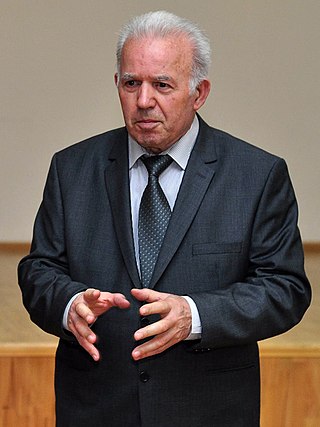
Lyudvig Alekseyevich Chibirov was the Chairman of the Parliament and later, following inaugural elections the first President of South Ossetia. Born in 1932, Chibirov is a former member of the South Ossetian Parliament. Prior to the elections in 1996, he had been South Ossetia's head of state since 1993. When the post of Chairman of the Parliament was abolished in favor of the presidency, Chibirov became the first occupant of the new office.

South Ossetia, a mostly unrecognized republic in the South Caucasus, formerly the South Ossetian Autonomous Oblast within the Georgian Soviet Socialist Republic with its capital in Tskhinvali, held a referendum on independence on November 12, 2006.

The Communist Party of South Ossetia is a communist party in South Ossetia. The party was founded in 1993. As of 2004, the party claimed a membership of 1,500. The party seeks recognition of the Republic of South Ossetia, which is considered by most countries as part of Georgia
Torez Georgievich Kulumbegov, was a political leader of South Ossetia.
Dmitry Ivanovich Sanakoyev is a South Ossetian and Georgian politician, a former official in the secessionist government of South Ossetia and later, from 2007 to 2022, served as the Head of the Provisional Administration of South Ossetia, a rival entity established in the Georgian-controlled territories in the South Ossetia region by the Georgian government.

The People of South Ossetia for Peace movement was the opposition party and political movement in South Ossetia which was formed by the ethnic Ossetians who had been formerly members of the secessionist government in Tskhinvali and outspoken critics of de facto separatist regime in Tskhinvali, headed at that time by Eduard Kokoity.
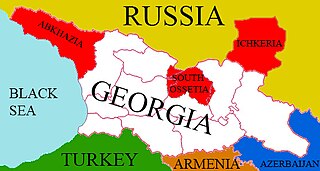
The 1991–1992 South Ossetia War was fought between Georgian government forces and ethnic Georgian militia on one side and the forces of South Ossetia and North Ossetian volunteers who wanted South Ossetia to secede from Georgia and become an independent state on the other. The war ended with a Russian-brokered ceasefire, signed on 24 June 1992, which established a joint peacekeeping force and left South Ossetia divided between the rival authorities.

The Parliament of South Ossetia is the unicameral legislature of the partially recognized Republic of South Ossetia. The 34 members of parliament are elected using a mixed system of Party-list proportional representation (17) and single-member districts (17). South Ossetia has a multi-party system, and currently 5 political parties are represented in parliament and has 6 independent MPs elected through single-member districts. The parliament is headed by a speaker, who is elected from among the members. Since 15 september 2022 the speaker of parliament is Alan Alborov, one of the four deputees of the Nykhaz party of president Alan Gagloev, after Alan Tadtaev of United Ossetia was forced to resign.
Gerasim "Rezo" Georgievich Khugayev is an Ossetian politician and former Prime Minister of the Republic of South Ossetia. He is the only South Ossetian Prime Minister to serve more than one time, at this date. He first served from October 1993 until May 1994 under Head of State Lyudvig Chibirov, and then again from December 2001 until August 2003, as the first Prime Minister appointed by President of South Ossetia Eduard Kokoity.
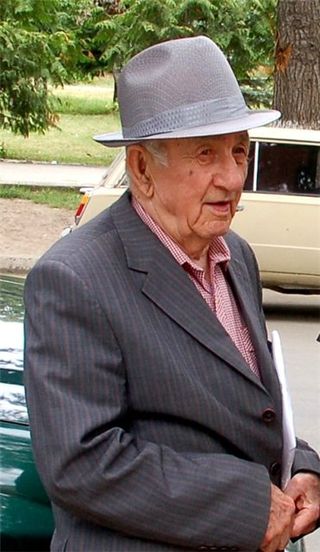
Znaur Nikolayevich Gassiyev was a South Ossetian politician, who was one of the leaders of the South Ossetian independence movement in the early 1990s, which culminated in the 1991–1992 South Ossetia War.
Aleksandr Apollonovich Shavlokhov is a South Ossetian politician and former Prime Minister, from 1996 until August 1998.
South Ossetia is an autonomous region in Georgia, approximately 1,000 metres (3,300 ft) above sea level on the slopes of the Greater Caucasus. Although it declared independence in 2008, only a few countries acknowledge it. The region is inhabited by Ossetians, an Iranian ethnic group. According to Russia, Nicaragua, Venezuela, Syria and Nauru, it is one of the world's newest independent states. All other states and international organisations consider South Ossetia an autonomous region of Georgia, functioning as a de facto state for twenty years after declaring independence and conducting a successful armed rebellion. Its Georgian inhabitants have been displaced. South Ossetia has been a source of tension for a number of years, with Georgia and Russia's political differences impeding peaceful independence and breeding a turbulent series of events which undermine the Universal Declaration of Human Rights.

Presidential elections were held in South Ossetia in 2001. As no candidate received a majority of the vote in the first round on 18 November, a second round was held on 6 December, which was won by Eduard Kokoity, who defeated Stanislav Kochiev. Incumbent president Lyudvig Chibirov was eliminated in the first round mostly due to popular disdain in his economic policies. The elections were boycotted by the Georgian population.

Presidential elections were held in the disputed territory of South Ossetia on 10 April 2022. As none of the presidential nominees obtained at least 50% of the votes, a runoff was held on 8 May 2022, between the top two candidates, Alan Gagloyev and incumbent president Anatoly Bibilov.
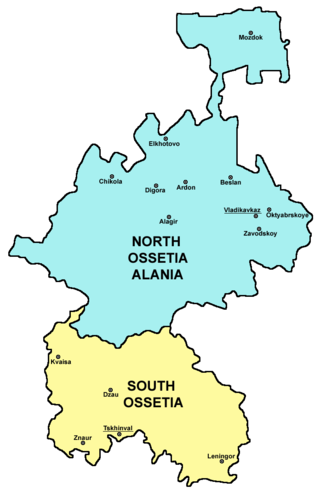
South Ossetia is a partially recognized and Russian-occupied separatist state internationally recognized as part of Georgia. It is mainly inhabited by Ossetians, an ethnic group also dominant in North Ossetia, which is part of Russia. South Ossetia separated itself from Georgia following the 1991–1992 South Ossetia War with the help of Russia, remaining ever since as a state closely allied with this country.

Parliamentary elections were held in South Ossetia on 12 May 1999. They were the third elections in the then unrecognized state since its de facto independence following the First South Ossetia War and the first elections after the territory became a semi-presidential republic with a new constitution ratified on 27 November 1996. Prior to this, South Ossetia had no executive branch of government, and the Speaker of Parliament was the head of state.